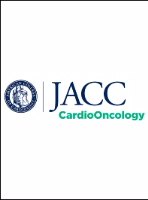
JACC: CardioOncology
Scope & Guideline
Advancing the Frontiers of Cardiac and Cancer Care
Introduction
Aims and Scopes
- Cardiovascular Risk Assessment in Cancer Patients:
The journal emphasizes the importance of accurately assessing cardiovascular risks in cancer patients, particularly those undergoing chemotherapy and radiotherapy, to mitigate potential cardiovascular complications. - Management of Cardiotoxicity:
Research published in the journal frequently addresses the mechanisms of cardiotoxicity from various cancer treatments, including chemotherapy and immunotherapy, and explores strategies for prevention and management. - Impact of Cancer Treatments on Cardiac Health:
The journal focuses on how different cancer therapies, such as anthracyclines and immune checkpoint inhibitors, affect cardiac function, leading to conditions like heart failure or arrhythmias. - Social Determinants and Health Disparities:
There is a growing emphasis on understanding how social determinants of health influence cardiovascular outcomes in cancer patients, addressing disparities in care and outcomes. - Innovative Therapeutic Approaches:
The journal highlights novel therapeutic strategies, including the use of biomarkers, genetic screening, and new pharmacological agents aimed at protecting cardiac health in cancer patients.
Trending and Emerging
- Integration of Artificial Intelligence and Technology:
There is a notable trend towards utilizing artificial intelligence and advanced imaging technologies to enhance cardiovascular risk prediction and management in cancer patients. - Personalized Medicine and Genomic Approaches:
The journal is increasingly focusing on personalized medicine, exploring genetic predispositions to cardiotoxicity and tailoring treatment plans based on individual patient profiles. - Health Equity and Disparities in Care:
Emerging themes highlight the importance of addressing health equity, focusing on disparities in cardiovascular care among diverse populations affected by cancer. - Exercise and Rehabilitation in Cancer Survivors:
There is a growing emphasis on the role of physical activity and rehabilitation programs in improving cardiovascular health and overall quality of life for cancer survivors. - Long-Term Cardiovascular Monitoring and Follow-Up:
The trend is moving towards establishing protocols for long-term cardiovascular monitoring of cancer survivors to detect and manage late-onset cardiovascular complications.
Declining or Waning
- Traditional Cardiovascular Risk Factors:
There seems to be a decreasing emphasis on traditional cardiovascular risk factors in isolation, as the focus shifts towards integrated approaches that consider the unique cardiovascular challenges posed by cancer therapies. - General Cardiovascular Guidelines:
General cardiovascular guidelines without specific adaptations for cancer patients are becoming less relevant, as the journal increasingly prioritizes tailored guidelines that address the complexities of treating patients with coexisting cancer and cardiovascular disease. - Single-Disease Focus:
Research that solely examines cardiovascular issues without considering the cancer context is declining, as the journal emphasizes the importance of understanding the interplay between cancer treatment and cardiovascular health.
Similar Journals
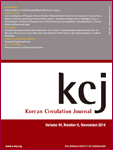
Korean Circulation Journal
Connecting Researchers and Practitioners for Heart Health Advancements.Korean Circulation Journal, published by the Korean Society of Cardiology, has established itself as a prominent platform for disseminating research in the fields of Cardiology and Cardiovascular Medicine. With an ISSN of 1738-5520 and an E-ISSN of 1738-5555, this journal has been at the forefront of cardiovascular science since its inception in 2006 and is projected to continue until 2024. The journal's commitment to quality is reflected in its 2023 category quartiles, ranking in the second quartile (Q2) for both Cardiology and Internal Medicine, as well as its commendable Scopus rankings within the respective fields. Located in South Korea, the journal aims to bridge the gap between cutting-edge research and practical applications, serving as an invaluable resource for researchers, healthcare professionals, and students keen on advancing their understanding of cardiovascular health. Although currently not an open-access journal, it provides a wealth of knowledge that encourages evidence-based practice in clinical settings.
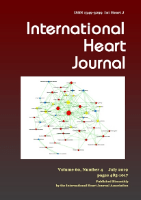
International Heart Journal
Elevating Understanding of Heart Disease WorldwideInternational Heart Journal, published by INT HEART JOURNAL ASSOC, serves as a pivotal platform for research and discourse in the fields of cardiology and cardiovascular medicine. With its ISSN 1349-2365 and E-ISSN 1349-3299, this esteemed journal is based in Japan and is located at the University of Tokyo, Graduate School of Medicine, Department of Cardiovascular Medicine. Since its inception in 2005, International Heart Journal has blossomed into a respected publication with an impact factor that signifies its growing relevance, ranking in the Q3 category of both cardiology and miscellaneous medicine as of 2023. This journal not only disseminates vital research findings but also fosters collaboration among researchers and healthcare professionals. Notable for its Open Access options, it ensures the availability of its content to a broader audience, thereby enhancing knowledge transfer and innovation in cardiovascular care. With an ongoing commitment to improve clinical practice and patient outcomes, the journal continues to be an essential resource for those dedicated to advancing the understanding of heart health and disease.

Journal of Cardiovascular Development and Disease
Leading the charge in cardiovascular research and discovery.Journal of Cardiovascular Development and Disease, an esteemed publication by MDPI, has been a dedicated platform for disseminating cutting-edge research since its inception in 2014. Based in Switzerland, this Open Access journal not only provides unrestricted access to its content but also fosters global collaboration among scholars focusing on cardiovascular health and disease development. With an impressive focus classified as Q1 in Pharmacology, Toxicology and Pharmaceutics for 2023, it attracts a diverse range of interdisciplinary research, supporting advancements in pharmacological applications relevant to cardiac conditions. The journal's ongoing convergence through 2024 highlights its commitment to the evolving landscape of cardiovascular research, making it a vital resource for researchers, professionals, and students alike who are keen to contribute to and learn from significant developments in this critical field.

Cardiology Journal
Connecting researchers to critical cardiac discoveries.Cardiology Journal, published by VIA MEDICA, stands as a prominent resource in the field of cardiology and cardiovascular medicine, with an ISSN of 1897-5593 and an E-ISSN of 1898-018X. Recognized for its Open Access model established since 1994, this journal facilitates widespread dissemination of critical research findings, allowing practitioners and researchers globally to access valuable insights without barriers. Based in Poland, with an address at UL SWIETOKRZYSKA 73, 80-180 GDANSK, it has achieved a respectable Q2 classification in 2023 for both Cardiology and Miscellaneous Medicine categories, reflecting its influence and quality within the scholarly community. With a Scopus ranking placing it at #117 out of 387 in Cardiology, it lies within the 69th percentile, underpinning its commitment to advancing knowledge in cardiovascular health. The journal’s converged years extending from 2006 to 2024 ensure it captures ongoing developments in a rapidly evolving field. As such, the Cardiology Journal serves as an indispensable platform for researchers, professionals, and students dedicated to exploring the frontiers of cardiac science and improving patient care.
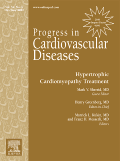
PROGRESS IN CARDIOVASCULAR DISEASES
Elevating Standards in Cardiovascular ResearchPROGRESS IN CARDIOVASCULAR DISEASES is a leading journal in the field of cardiology and cardiovascular medicine, published by W B SAUNDERS CO-ELSEVIER INC. With an impressive impact factor that places it in the esteemed Q1 quartile of its category, this journal ranks among the top 32 out of 387 journals in its field, positioning itself in the 91st percentile. Since its inception in 1958 and continuing until 2024, it has been a prolific source of cutting-edge research, reviews, and clinical insights that contribute significantly to the understanding and treatment of cardiovascular diseases. Although it does not currently offer open access options, the journal's rigorous peer-review process ensures that all published content meets the highest standards of scientific excellence. As a key resource for researchers, practitioners, and students alike, PROGRESS IN CARDIOVASCULAR DISEASES serves as an indispensable tool for advancing knowledge and practice in cardiovascular health.
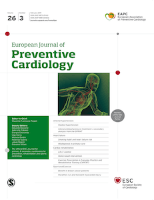
European Journal of Preventive Cardiology
Connecting researchers to advance cardiovascular prevention.The European Journal of Preventive Cardiology, published by Oxford University Press, is a leading international journal dedicated to the field of cardiology and cardiovascular medicine. With an impact factor that underscores its prestige—ranking in the top quartile (Q1) of both cardiology and epidemiology categories—the journal serves as a critical resource for researchers and practitioners seeking to advance their understanding of preventive strategies in cardiovascular health. Since its inception in 1999, it has provided a platform for high-quality research and reviews that address the epidemiology of cardiovascular diseases, risk factor management, and innovative prevention methodologies. Notably, it currently ranks #21 out of 387 in Medicine - Cardiology and #13 out of 148 in Medicine - Epidemiology according to Scopus, highlighting its influential position in these essential biomedical fields. The journal also provides open access options, allowing both readers and authors the opportunity to engage with groundbreaking research and enhance the dissemination of knowledge. With a commitment to excellence, the European Journal of Preventive Cardiology is an invaluable asset for those dedicated to the prevention of cardiovascular diseases.

Netherlands Heart Journal
Fostering Innovation in Heart Health Through Scholarly DiscourseNetherlands Heart Journal is a premier academic publication dedicated to advancing knowledge in the field of cardiology and cardiovascular medicine. Published by BOHN STAFLEU VAN LOGHUM BV, this journal has established itself as a critical platform for researchers, professionals, and students seeking to explore groundbreaking findings and innovative practices in cardiovascular health. With an ISSN of 1568-5888 and E-ISSN 1876-6250, the journal boasts a respectable Q2 ranking in the Cardiology and Cardiovascular Medicine category, placing it in the top half of its field according to the 2023 quartiles. The Scopus ranking places it 130th out of 387 in the relevant category, indicating a commendable percentile rank of 66th, which attests to its influence and quality of published research. Spanning from 2005 to 2024, the journal endeavors to include a diverse array of topics, encompassing clinical practice, technological innovations, and public health considerations related to cardiovascular diseases. Researchers and practitioners are encouraged to engage with the journal's robust content, contributing to and benefiting from the collaborative effort to enhance cardiovascular health worldwide.

Current Cardiology Reports
Redefining cardiology through rigorous inquiry and collaboration.Current Cardiology Reports, published by Springer, is a leading peer-reviewed journal dedicated to advancing the field of cardiology and cardiovascular medicine. With its ISSN 1523-3782 and E-ISSN 1534-3170, the journal offers a platform for researchers and practitioners to share innovative research findings, clinical insights, and comprehensive reviews, contributing to the ongoing dialogue in cardiovascular health. Recognized for its high impact, Current Cardiology Reports holds a prestigious Q1 ranking in the Cardiology category for 2023 and ranks #83 out of 387 in Scopus, placing it in the 78th percentile among journals in its field. The journal, converging its insights from 1999 to 2024, aims to disseminate valuable knowledge that can inform clinical practice and influence future research directions. Although not an Open Access journal, the rich content and timely articles published within its pages are invaluable to both seasoned professionals and emerging scholars in cardiology. Based in New York, United States, the journal continues to play a critical role in shaping cardiovascular medicine through rigorous scientific inquiry and education.
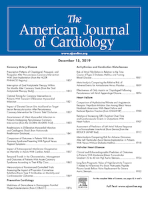
AMERICAN JOURNAL OF CARDIOLOGY
Driving Innovation in Heart Health and Clinical OutcomesThe American Journal of Cardiology is a leading peer-reviewed journal in the field of Cardiology and Cardiovascular Medicine, published by Excerpta Medica Inc-Elsevier Science Inc. Since its inception in 1958, the journal has consistently contributed to the advancement of cardiovascular research, providing a platform for groundbreaking studies and clinical findings that shape modern medical practices. With an impressive impact factor placing it in the Q1 category in its field for 2023, it ranks among the top journals in medicine, with a rank of #155 out of 387 in the Scopus database, reflecting its significance and rigorous editorial standards. The journal is committed to disseminating high-quality research that fosters innovation and enhances clinical outcomes in cardiology. Although it does not provide Open Access options, the American Journal of Cardiology remains an essential resource for researchers, healthcare professionals, and students looking to deepen their understanding of cardiovascular health.

Cardiovascular Toxicology
Exploring the critical intersection of toxicology and cardiology.Cardiovascular Toxicology is a pivotal journal dedicated to advancing the understanding of the interplay between toxic substances and cardiovascular health. Published by HUMANA PRESS INC, this journal serves as a critical resource for researchers and professionals in the fields of cardiology, toxicology, and molecular biology. With an ISSN of 1530-7905 and an E-ISSN of 1559-0259, it has established itself as a key source of high-quality research since its inception in 2001, continuing to contribute valuable insights through 2024. The journal enjoys a robust reputation, evidenced by its Q2 ranking in both Cardiology and Cardiovascular Medicine and Toxicology, along with a Q3 ranking in Molecular Biology for 2023. With Scopus rankings placing it in the 80th percentile for Cardiology and 71st for Toxicology, Cardiovascular Toxicology attracts submissions that reflect cutting-edge research and innovative methodologies. Notably, the journal prioritizes stringent peer review and scholarly rigor, ensuring that published works significantly impact the understanding of cardiovascular responses to various toxic agents. Though not an open-access journal, its content remains highly sought after in a diverse scholarly community, making it indispensable for those dedicated to enhancing cardiovascular disease prevention, diagnosis, and treatment through toxicological insights.